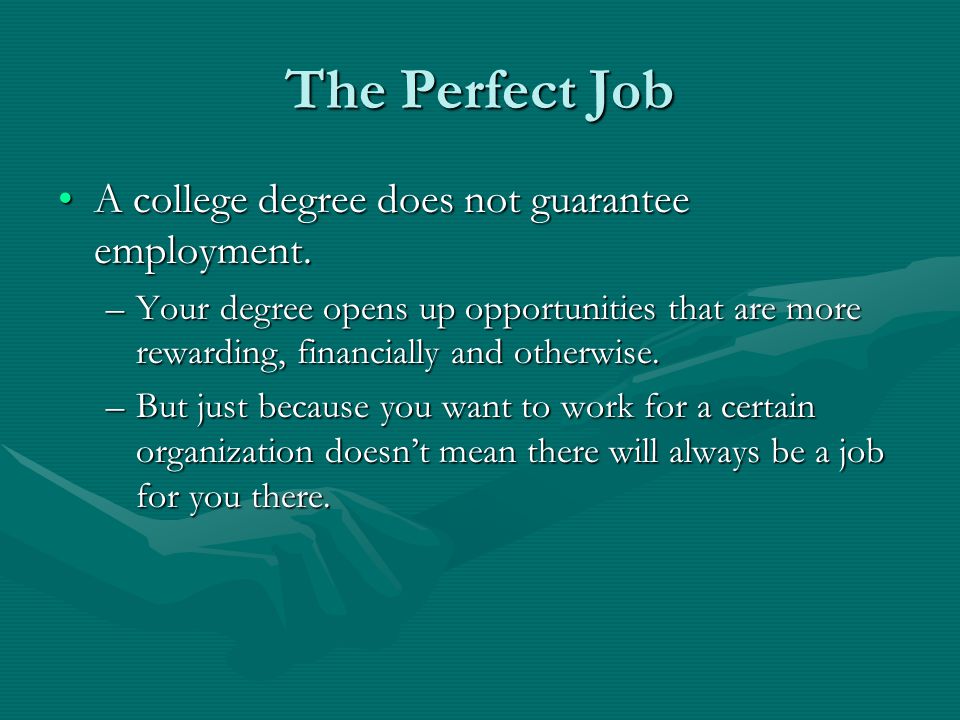College does not guarantee a job due to the dynamic nature of the job market and the specific skills employers seek. Theoretical knowledge alone may not match industry requirements.
Navigating the transition from academia to the professional world can be challenging for many graduates. While college provides foundational knowledge and critical thinking skills, it does not always offer the hands-on experience or specialized skill sets that certain jobs demand.
Today’s job market evolves rapidly, with emerging industries and technological advancements outpacing traditional curricula. Employers often look for candidates with practical experience, up-to-date technical skills, and the ability to adapt quickly. College education is a valuable stepping stone, but it is the combination of education, experience, and personal initiative that often leads to successful employment. Candidates must actively seek internships, networking opportunities, and continuous learning to enhance their employability. Therefore, college graduates should prepare to engage in lifelong learning and skill development to bridge the gap between education and employment.

Credit: slideplayer.com
The Changing Job Market Dynamics
Employer expectations have evolved significantly. Degrees alone no longer suffice for many job roles. Employers now seek a blend of education and practical skills. The job market heavily focuses on relevant experience and skill sets that align with their needs.
Technology’s rapid advancement has transformed the workplace. Many tasks once done by humans are now automated. Consequently, there’s a growing demand for tech-savvy individuals. Employers prefer candidates who can adapt to new technologies quickly. A college degree may not cover these specific technical skills that are in high demand.

Credit: www.fastweb.com
Misalignment Of Academic Curriculum And Industry Needs
Academic institutions often focus on theoretical knowledge.
This leads to a lack of hands-on experience in students.
Educational programs may not align with real-world job requirements.
The job market is evolving rapidly, demanding new skills and competencies.
Employers seek candidates with practical abilities and industry-specific expertise.
Colleges struggle to keep up with these changes.
Thus, graduates may find themselves unprepared for employment opportunities.
Courses need to incorporate current industry practices to bridge the gap.
The Significance Of Experience And Networking
Experience and networking play key roles in securing employment after college. Hands-on practice gained through internships often provides a crucial edge. Interns learn real workplace skills. Employers look for this practical experience in candidates.
Building a professional network is also essential. The saying, “It’s not what you know, but who you know,” remains true. Networking events and social platforms can connect graduates with industry professionals. These connections can lead to job opportunities and career growth.
| Internship Benefits | Networking Strategies |
|---|---|
| – Skill enhancement | – Attend industry gatherings |
| – Insight into career paths | – Use LinkedIn actively |
| – Build professional references | – Connect with alumni groups |
Economic Factors Influencing Employment
Economic cycles play a significant role in job availability. During recessions, companies often freeze hiring. This leads to fewer job opportunities for recent college graduates. Young professionals may struggle to find work aligned with their degrees.
Outsourcing and globalization reshape job markets. Firms seek lower operational costs, moving jobs abroad. This can result in local job scarcity. Graduates might find their skills in lower demand within their home country. Competition increases as workers worldwide vie for the same positions.
Strategies To Enhance Employability Post-college
A strong step towards job security involves constant learning and upskilling. Earn new certifications and partake in relevant courses. These efforts showcase your dedication to professional growth. Equally important is building a strong personal brand.
Develop a professional online presence. Create profiles on networks like LinkedIn. Share insights and engage with industry talk. Show the world who you are professionally. All eyes are on the digital sphere.

Credit: in.pinterest.com
Frequently Asked Questions Of Why Doesn’t College Guarantee A Job
Why Are You Not Guaranteed A Job After College?
A job after college isn’t guaranteed due to market competition, limited openings, and the demand for experience. Networking, relevant skills, and internships play a crucial role in job acquisition.
Does Going To College Guarantee You A Job?
Attending college does not guarantee a job. Employment depends on various factors including industry demand, experience, and networking.
Why Is It So Hard To Get A Job After College?
Securing a job post-college can be challenging due to high competition, specific skill demands, limited experience, and a saturated job market. Networking and tailored skill development are essential for new graduates to stand out.
Does College Really Get You A Job?
College education can improve job prospects, offering specialized knowledge and skills employers seek. However, it doesn’t guarantee a job, as market demands and networking play crucial roles.
Conclusion
Navigating the gap between academia and employment is complex. A degree often opens doors, yet it’s not a job ticket. Skills, experiences, and networking significantly influence hiring. Graduates must proactively bridge education to career realities. Thus, lifelong learning and adaptability become crucial in securing and excelling at desired jobs.

